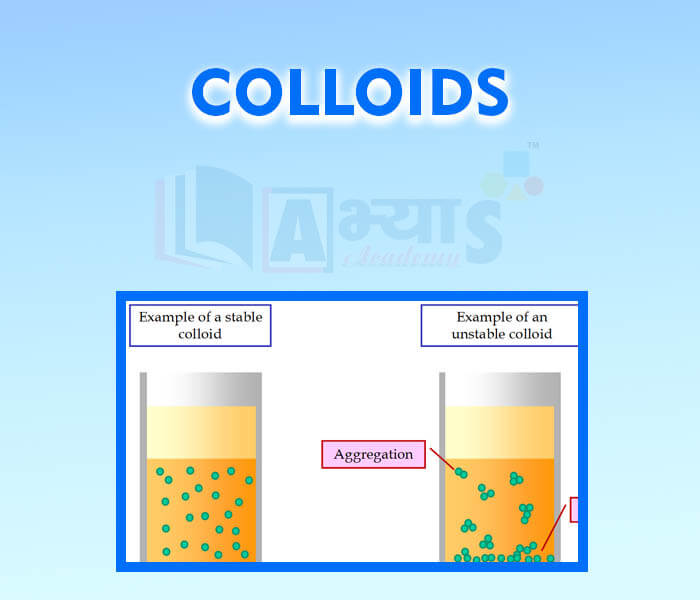Colloids













Colloids or Colloidal Solutions
A colloid has properties that are intermediate between those of a true solution and a suspension. Colloids have particles that are larger than the particles of a true solution but are smaller than those of a suspension. Between these extremes dispersed particles that are large than molecules, but not so large that the components of the mixture separate under the influence of gravity. These intermediate types of dispersions are called colloidal dispersion, or simply colloids. Colloids form the dividing line between solution and heterogeneous mixtures.
Examples :-
Colloids or colloidal solutions are milk, ink, blood, toothpaste, starch solution, air (containing dust), clouds, mist (dispersion of water droplets in air), smoke and jellies. A colloid is usually translucent or opaque.
Properties of a colloidal solution :-
Which of the following is a colloid ? | |||
| Right Option : C | |||
| View Explanation | |||
Which of the following statements is true about the colloidal solution? | |||
| Right Option : D | |||
| View Explanation | |||
Colloidal solution can be purified by ________________________ | |||
| Right Option : C | |||
| View Explanation | |||
Students / Parents Reviews [10]
My experience with Abhyas academy is very good. I did not think that my every subject coming here will be so strong. The main thing is that the online tests had made me learn here more things.

Hiya Gupta
8thMy experience was very good with Abhyas academy. I am studying here from 6th class and I am satisfied by its results in my life. I improved a lot here ahead of school syllabus.

Ayan Ghosh
8thI have spent a wonderful time in Abhyas academy. It has made my reasoning more apt, English more stronger and Maths an interesting subject for me. It has given me a habbit of self studying

Yatharthi Sharma
10thOne of the best institutes to develope a child interest in studies.Provides SST and English knowledge also unlike other institutes. Teachers are co operative and friendly online tests andPPT develope practical knowledge also.

Aman Kumar Shrivastava
10thIt was good as the experience because as we had come here we had been improved in a such envirnment created here.Extra is taught which is beneficial for future.

Eshan Arora
8thAbhyas is a complete education Institute. Here extreme care is taken by teacher with the help of regular exam. Extra classes also conducted by the institute, if the student is weak.

Om Umang
10thAbout Abhyas metholodology the teachers are very nice and hardworking toward students.The Centre Head Mrs Anu Sethi is also a brilliant teacher.Abhyas has taught me how to overcome problems and has always taken my doubts and suppoeted me.

Shreya Shrivastava
8thAbhyas Methodology is very good. It is based on according to student and each child manages accordingly to its properly. Methodology has improved the abilities of students to shine them in future.

Manish Kumar
10thIt was a good experience with Abhyas Academy. I even faced problems in starting but slowly and steadily overcomed. Especially reasoning classes helped me a lot.

Cheshta
10thIt has a great methodology. Students here can get analysis to their test quickly.We can learn easily through PPTs and the testing methods are good. We know that where we have to practice
